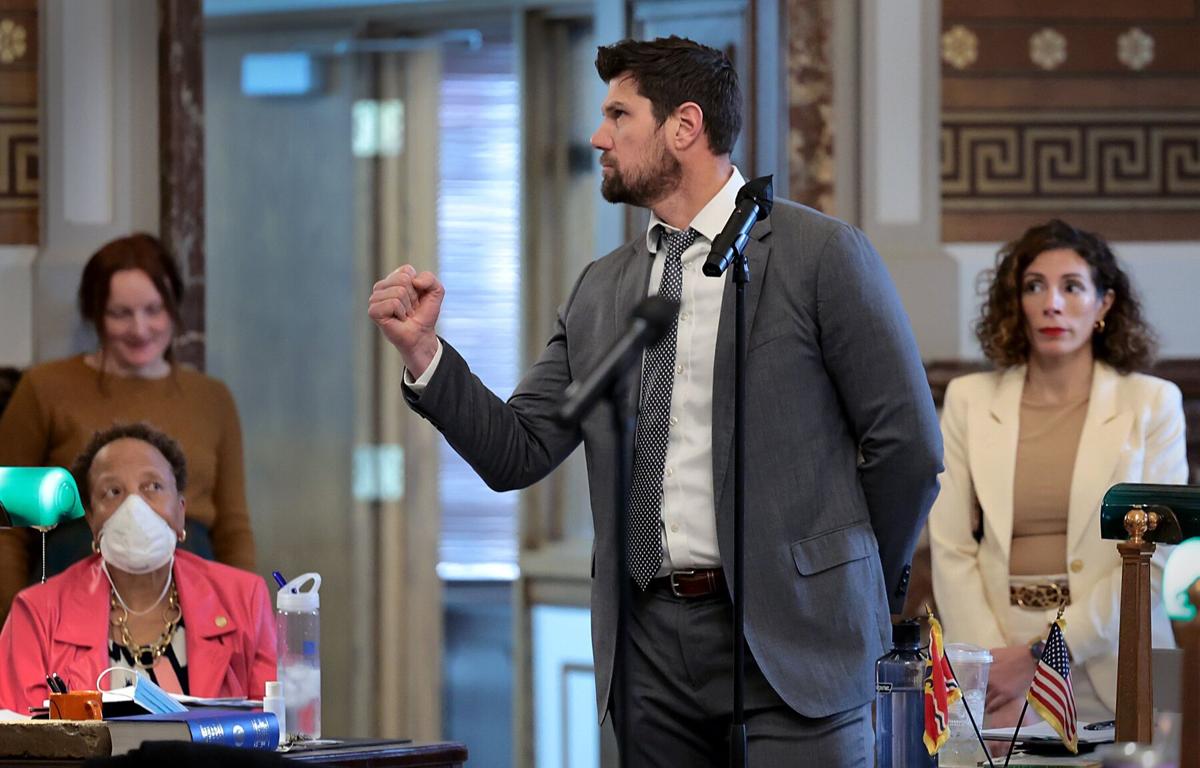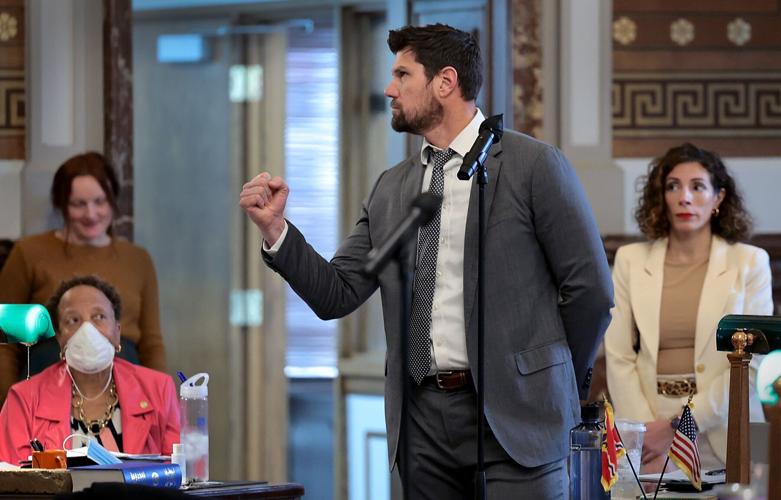ST. LOUIS — A grand plan to spend $290 million in Rams relocation settlement money, backed by some of the city’s most prominent officials, faltered at the Board of Aldermen on Friday in dramatic fashion, with members primed to reject it.
Aldermanic President Megan Green, sensing the mutiny, ended the meeting in the middle of debate and walked out of the chamber.
“You want to play games,” she said as she departed, “we’ll play games.”

Aldermanic President Megan Green listens to discussion during a meeting of the Board of Aldermen on Friday, Jan. 31, 2025. in St. Louis City Hall.
The adjournment came just as a revolt against the plan, led off by Alderman Tom Oldenburg, of St. Louis Hills, was taking shape.
Green and her allies, including Mayor Tishaura O. Jones, were pushing to pass a sweeping bill aimed at fixing streets and water pipes, building up affordable housing and small businesses — and creating new programs to pay for daycare and college for the children of city workers. It was to be the culmination of more than a year of work.
People are also reading…
There had been a competing plan put forth by business leaders to pump some cash into downtown, paired with more money for struggling neighborhoods to the north and south. But the mayor and Alderwoman Alisha Sonnier had worked on a compromise that gave downtown its chunk of money and scaled back the child care and college funds.
They held a press conference to announce the deal Jan. 21.
But Green, who never endorsed the compromise, put the new bill at risk last week when she moved to claw back some of the money for downtown in favor of child care subsidies, her top priority in the bill. She saw the changes as being responsive to child care and social justice advocates who felt business interests were getting too much.
Alderwoman Pam Boyd, who had introduced the business lobby’s bill and negotiated the compromise with Sonnier, felt betrayed.
That left other aldermen — some supportive of more money for downtown, some skeptical the city could manage new programs, others underwhelmed by both plans — with an opening.
They came up with a new plan: Scrap everything in the big bill except $40 million for the city’s aging water system, a popular item.
Alderwoman Anne Schweitzer, of Boulevard Heights, said the thinking was that aldermen could at least show they could get something done, and then take time to figure out the rest of money.
On Friday, they put it to the test.
Oldenburg made a procedural motion to set the stage for the water-only plan. And remarkably, it passed.

Alderwomen Pamela Boyd, left, talks about the bill for Rams settlement spending with Alisha Sonnier, center, and Daniela Velazquez during a meeting of the Board of Aldermen on Friday, Jan. 31, 2025 in St. Louis City Hall.
Sonnier moved to take up the original compromise bill, without Green’s changes. She said she remained committed to the deal she forged with Boyd.
“I had a conversation and I’m a woman of my word,” she said.
But Boyd said it was too late to fix things.
As tension mounted, and Schweitzer moved to introduce the water-only plan, Green announced she was suspending the meeting, slammed the gavel and walked out.
There were cries of exasperation from some, and smiles from others. A few aldermen questioned whether Green could legally do what she did. But she wasn’t coming back.
Oldenburg predicted the delay wouldn’t sway the board.
“We had a solid eight votes on water. Maybe nine,” he said. “Probably more now after this ‘take your ball and go home’ crap.”
Others poked at Green as a sore loser.
Alderman Joe Vollmer talks about Aldermanic Pres. Megan Green's decision to recess a meeting of the Board of Aldermen after a plan for spending Rams settlement money was voted down.
“She tried to cut things off,” said Alderman Joe Vollmer, of the Hill, “because she’s not getting what she wants.”
A flurry of statements and press conferences followed.
Jones and Greater St. Louis, the region’s main business lobby, urged aldermen to reconsider the original compromise.
Green defended clawing back money from downtown. “Corporate interests do not get to solely dictate what legislation looks like at the board,” she told reporters in her office.
Later, in a brief interview on her way out of the building, she was more conciliatory.
“There’s still a path forward,” she said, “but cooler heads must prevail.”
And she said that included hers.
St. Louis Mayor Tishaura Jones talked about how city leaders compromised to determine how the Rams settlement funds are allocated on Jan. 21, 2025. Video by Allie Schallert, aschallert@post-dispatch.com

Alderwomen Cara Spencer talks with Alisha Sonnier, right, as Laura Keys looks over legislation at left during a meeting of the Board of Aldermen on Friday, Jan. 31, 2025 in St. Louis City Hall.

Alderwoman Pamela Boyd, center, is flanked by fellow Board of Aldermen members Anne Schweitzer and Joe Vollmer, as she speaks before the board on Friday, Jan. 31, 2025 in St. Louis City Hall.

Alderwoman Alisha Sonnier speaks before a meeting of the Board of Aldermen on Friday, Jan. 31, 2025 in St. Louis City Hall.

Aldermanic President Megan Green leaves a meeting of the Board of Aldermen after calling for a recess on Friday, Jan. 31, 2025, at St. Louis City Hall.

St. Louis Mayor Tishaura O. Jones, center, talks with her spokesman Conner Kerrigan, left, and Denis Beganovic following a meeting of the Board of Aldermen where a plan for spending Rams settlement money was voted down on Friday, Jan. 31, 2025 in St. Louis City Hall.


















